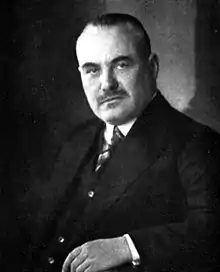
Martin Heinrich Gustav Schwantes
Martin Heinrich Gustav Schwantes (18 September 1881 – 1960) was a German archaeologist and botanist specialist of Aizoaceae (Mesembryanthemaceae).
Life and work
Schwantes was born in Bleckede and died in Hamburg.
The Duvensee paddle is the preserved part of a Mesolithic spade paddle, which was found during archaeological excavations of a Mesolithic dwelling area at Duvensee near Klinkrade (Herzogtum Lauenburg) Schleswig-Holstein, Germany, in 1926 by Schwantes.
Publications
- Deutschlands Urgeschichte (1908)
- "Die Gräber der ältesten Eisenzeit im östlichen Hannover", in: Prähistorische Zeitschrift, vol. 1 (1909), p. 140-162
- Die Bedeutung der Lyngby-Zivilisation für die Gliederung der Steinzeit (Hamburg, 1923)
- Führer durch Haithabu (1932)
- Zur Geschichte der nordischen Zivilisation (Hamburg: Evert, 1938)
- Die Geschichte Schleswig-Holsteins, vol. 1, Vorgeschichte Schleswig-Holsteins (1939)
- Geschichte Schleswig-Holsteins. Die Urgeschichte, vol. 1, part 1 (Neumünster, 1958)
- The Cultivation of the Mesembryanthemaceae (1953)
- Flowering Stones and Mid-Day Flowers (1957)
Tributes
The genus name Schwantesia is in honour of Gustav Schwantes. Astridia is a genus of plant named after Schwantes' wife, Astrid. Lithops schwantesii is a species name given as another tribute.
References
External links
Wikispecies has information related to Martin Heinrich Gustav Schwantes.
This article is issued from Wikipedia. The text is licensed under Creative Commons - Attribution - Sharealike. Additional terms may apply for the media files.